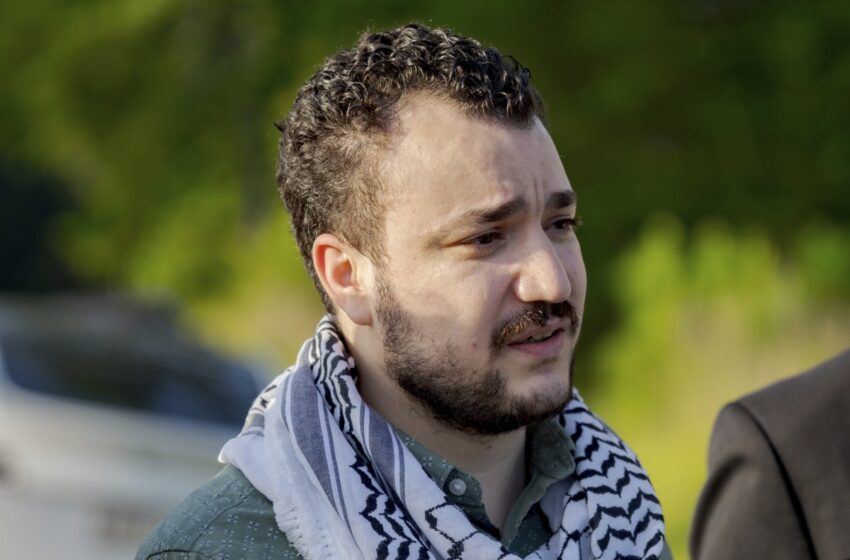What is the deportation order’s legal basis in Mahmoud Khalil’s case? Is he guilty?

Palestinian activist Mahmoud Khalil speaks after his release from federal immigration detention in Jena, Louisiana, on June 20. Image Credit: Matthew Hinton/AP
An immigration judge in Louisiana has ordered Mahmoud Khalil, a pro-Palestinian activist and U.S. legal permanent resident, to be deported to Syria or Algeria. Court documents revealed Wednesday show Judge Jamee Comans ruled that Khalil failed to disclose information on his green card application, a decision his lawyers vow to appeal.
Khalil, a former Columbia University graduate student, has long accused the Trump administration of targeting him for his political activism. He insists the deportation order is an attempt to silence his free speech and punish his involvement in pro-Palestinian campus protests.
Why the Judge Ordered Deportation
According to filings, Khalil allegedly omitted past employment details and organizational memberships during his green card process. The government argues these omissions amount to willful misrepresentation, grounds for removal under U.S. immigration law.
The order came despite a federal court in New Jersey previously blocking his deportation on separate foreign policy grounds. That court found that deportation under a rarely used law, which allows removal if the Secretary of State believes a person’s presence harms U.S. foreign policy, risked violating constitutional rights.
Khalil’s Lawyers Say Deportation Is Retaliation
Khalil’s legal team argues the ruling is part of a wider crackdown on foreign-born pro-Palestinian academics. They maintain the immigration court is being used as a tool of political retaliation.
In a statement, Khalil denounced the decision:
“It is no surprise that the Trump administration continues to retaliate against me for my exercise of free speech. Their latest attempt, through a kangaroo immigration court, exposes their true colors once again.”
READ ALSO
The U.S.– Ghana deportation dispute: What to know
Why Eswatini? Inside the surprising deportation choice for Kilmar Abrego Garcia
Appeal Timeline and What’s Next
Khalil’s attorneys have 30 days from September 12 to appeal to the Board of Immigration Appeals. If that fails, they could petition the 5th Circuit Court of Appeals, though his lawyers note the court “almost never” halts deportations for noncitizens. Meanwhile, a federal habeas case in New Jersey continues, and a court order there temporarily prevents his physical removal.
Khalil, detained earlier in 2025, missed key personal moments, including the birth of his child, during his detention. He was released in June under a prior court order after being detained for more than 100 days. His legal team plans to challenge the immigration judge’s decision vigorously. Khalil is now living in New York with his U.S. citizen wife and newborn son.
Why This Case Matters
The Khalil case highlights the intersection of immigration law, free speech, and foreign policy. Advocates warn that deporting lawful residents for alleged paperwork missteps linked to political activism could set a precedent chilling dissent on U.S. campuses.
FAQ: Why Was Mahmoud Khalil Ordered Deported?
Who is Mahmoud Khalil?
Mahmoud Khalil is a legal permanent U.S. resident of Palestinian-Algerian descent, formerly a Columbia University graduate student involved in pro-Palestinian activism.
What was the deportation order’s legal basis?
The order states Khalil “willfully misrepresented material facts” on his green card application and that his continued presence may harm U.S. foreign policy interests under a rarely-used provision of immigration law.
Is the order final?
No. His lawyers have filed an appeal with the Board of Immigration Appeals, and a separate federal court order currently prevents his immediate removal.
Does this case involve free speech issues?
Yes. Khalil’s legal team argues the government is targeting him for his pro-Palestinian speech, alleging the order is a suppression of his constitutional First Amendment rights. Critics warn this sets a precedent for political activism being grounds for deportation.
Where would Khalil be deported to?
Either Syria, where he was born in a refugee context, or Algeria, where he holds citizenship through family lineage.

